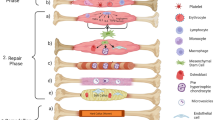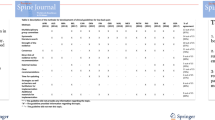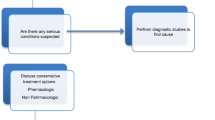Abstract
Fragility vertebral fractures often are associated with chronic back pain controlled by analgesic compounds. Capacitive coupling electrical stimulation is a type of electrical stimulation technology approved by the US FDA to noninvasively enhance fracture repair and spinal fusion. These uses suggest it would be a possible treatment for patients with back pain attributable to vertebral fractures. We therefore randomized 51 postmenopausal women with multiple fractures and chronic pain to the use of one of two indistinguishable devices delivering either the standard capacitive coupling electrical stimulation by Osteospine™ (active group) or low intensity pulse (control group). Twenty patients of the active group and 21 of the control group (80%) completed the study for a total duration of 3 months. The mean visual analog scale values for pain and the Quality of Life Questionnaire of the European Foundation for Osteoporosis (QUALEFFO) scores improved in both groups. We observed a relationship between hours of treatments and reductions in pain intensity only in the active group. Capacitive coupling electrical stimulation was not more effective than control treatment when comparing mean visual analog scale pain and QALEFFO scores in the two groups and when adjusting for the hours of treatment. However, the proportion of patients able to discontinue NSAIDs owing to elimination or reduction of pain was greater in the active group than in the control group. We interpret these findings as suggesting capacitive coupling electrical stimulation controls pain in some patients and reduces the use of NSAIDs.
Level of Evidence: Level I, therapeutic study. See Guidelines for Authors for a complete description of levels of evidence.


Similar content being viewed by others
References
Brighton CT, Hozack WJ, Brager MD, Windsor RE, Pollack SR, Vreslovic EJ, Kotwick JE. Fracture healing in the rabbit fibula when subjected to various capacitively coupled electrical fields. J Orthop Res. 1985;3:331–340.
Brighton CT, Luessenhop CP, Pollack SR, Steinberg DR, Petrik ME, Kaplan FS. Treatment of castration-induced osteoporosis by a capacitively coupled electrical signal in rat vertebrae. J Bone Joint Surg Am. 1989;71:228–236.
Brighton CT, Pollack SR. Treatment of recalcitrant non-union with a capacitively coupled electrical field: a preliminary report. J Bone Joint Surg Am. 1985;67:577–585.
Brighton CT, Wang W, Seldes R, Zhang G, Pollack SR. Signal transduction in electrically stimulated bone cells. J Bone Joint Surg Am. 2001;83:1514–1523.
Edmond SL, Kiel DP, Samelson EJ, Kelly-Hayes M, Felson DT. Vertebral deformity, back symptoms, and functional limitations among older women: the Framingham Study. Osteoporos Int. 2005;16:1086–1095.
Francis RM, Aspray TJ, Hide G, Sutcliffe AM, Wilkinson P. Back pain in osteoporotic vertebral fractures. Osteoporos Int. 2008;19:895–903.
Frymoyer JW. Back pain and sciatica. N Engl J Med. 1988;318:291–300.
Gadsby JG, Flowerdew MW. Transcutaneous electrical nerve stimulation and acupuncture-like transcutaneous electrical nerve stimulation for chronic low back pain. Cochrane Database Syst Rev. 2000;2:CD000210.
Gan JC, Glazer PA. Electrical stimulation therapies for spinal fusions: current concepts. Eur Spine J. 2006;15:1301–1311.
Ghoname EA, Craig WF, White PF, Ahmed HE, Hamza MA, Henderson BN, Gajraj NM, Huber PJ, Gatchel RJ. Percutaneous electrical nerve stimulation for low back pain: a randomized crossover study. JAMA. 1999;281:818–823.
Goodwin CB, Brighton CT, Guyer RD, Johnson JR, Light KI, Yuan HA. A double-blind study of capacitively coupled electrical stimulation as an adjunct to lumbar spinal fusions. Spine (Phila Pa 1976). 1999;24:1349–1356; discussion 1357.
Huang C, Ross PD, Wasnich RD. Vertebral fracture and other predictors of physical impairment and health care utilization. Arch Intern Med. 1996;156:2469–2475.
Hurley DA, Minder PM, McDonough SM, Walsh DM, Moore AP, Baxter DG. Interferential therapy electrode placement technique in acute low back pain: a preliminary investigation. Arch Phys Med Rehabil. 2001;82:485–493.
Johnson MI, Tabasam G. A single-blind placebo-controlled investigation into the analgesic effects of interferential currents on experimentally induced ischaemic pain in healthy subjects. Clin Physiol Funct Imaging. 2002;22:187–196.
Köke AJ, Schouten JS, Lamerichs-Geelen MJ, Lipsch JS, Waltje EM, van Kleef M, Patijn J. Pain reducing effect of three types of transcutaneous electrical nerve stimulation in patients with chronic pain: a randomized crossover trial. Pain. 2004;108:36–42.
Lips P, Cooper C, Agnusdei D, Caulin F, Egger P, Johnell O, Kanis JA, Kellingray S, Leplege A, Liberman UA, McCloskey E, Minne H, Reeve J, Reginster JY, Scholz M, Todd C, de Vernejoul MC, Wiklund I. Quality of life in patients with vertebral fractures: validation of the Quality of Life Questionnaire of the European Foundation for Osteoporosis (QUALEFFO). Working Party for Quality of Life of the European Foundation for Osteoporosis. Osteoporos Int. 1999;10:150–160.
Lorich DG, Brighton CT, Gupta R, Corsetti JR, Levine SE, Gelb ID, Seldes R, Pollack SR. Biochemical pathway mediating the response of bone cells to capacitive coupling. Clin Orthop Relat Res. 1998;350:246–256.
Melton LJ 3rd, Lane AW, Cooper C, Eastell R, O’Fallon WM, Riggs BL. Prevalence and incidence of vertebral deformities. Osteoporos Int. 1993;3:113–119.
Melzack R, Vetere P, Finch L. Transcutaneous electrical nerve stimulation for low back pain: a comparison of TENS and massage for pain and range of motion. Phys Ther. 1983;63:489–493.
Pluijm SM, Tromp AM, Smit JH, Deeg DJ, Lips P. Consequences of vertebral deformities in older men and women. J Bone Miner Res. 2000;15:1564–1572.
Scott G, King JB. A prospective, double-blind trial of electrical capacitive coupling in the treatment of non-union of long bones. J Bone Joint Surg Am. 1994;76:820–826.
Weiner DK, Rudy TE, Glick RM, Boston JR, Lieber SJ, Morrow LA, Taylor S. Efficacy of percutaneous electrical nerve stimulation for the treatment of chronic low back pain in older adults. J Am Geriatr Soc. 2003;51:599–608.
Zambito A, Bianchini D, Gatti D, Rossini M, Adami S, Viapiana O. Interferential and horizontal therapies in chronic low back pain due to multiple vertebral fractures: a randomized, double blind, clinical study. Osteoporos Int. 2007;18:1541–1545.
Zambito A, Bianchini D, Gatti D, Viapiana O, Rossini M, Adami S. Interferential and horizontal therapies in chronic back pain: a randomized, double blind, clinical study. Clin Exp Rheumatol. 2006;24:534–539.
Zhuang H, Wang W, Seldes RM, Tahernia AD, Fan H, Brighton CT. Electrical stimulation induces the level of TGF-beta1 mRNA in osteoblastic cells by a mechanism involving calcium/calmodulin pathway. Biochem Biophys Res Commun. 1997;237:225–229.
Author information
Authors and Affiliations
Corresponding author
Additional information
Francesca de Terlizzi is an IGEA employee. This author certifies that she has or may receive payments or benefits from a commercial entity related to this work.
Each author certifies that his or her institution has approved the human protocol for this investigation, that all investigations were conducted in conformity with ethical principles of research, and that informed consent for participation in the study was obtained.
This work was performed at University of Verona.
About this article
Cite this article
Rossini, M., Viapiana, O., Gatti, D. et al. Capacitively Coupled Electric Field for Pain Relief in Patients with Vertebral Fractures and Chronic Pain. Clin Orthop Relat Res 468, 735–740 (2010). https://doi.org/10.1007/s11999-009-1088-z
Received:
Accepted:
Published:
Issue Date:
DOI: https://doi.org/10.1007/s11999-009-1088-z




